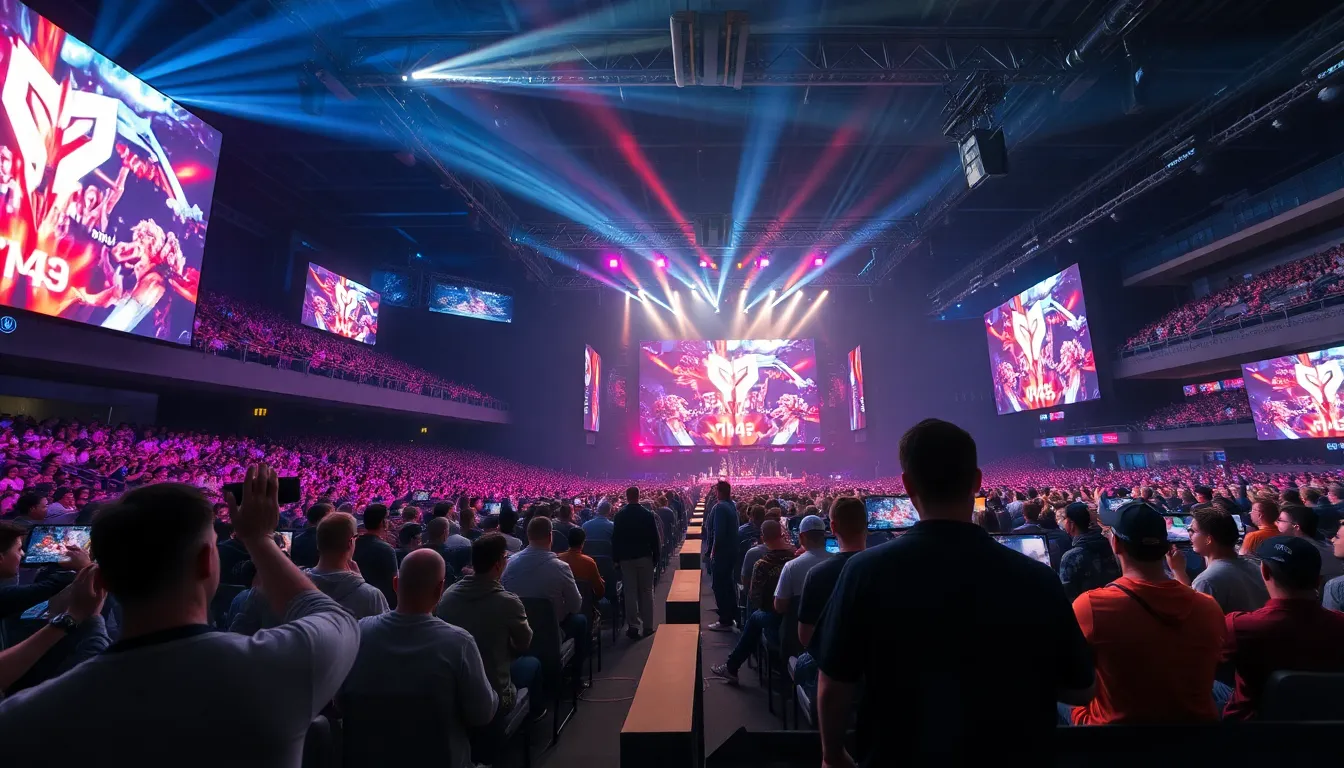Esports isn’t just kids playing video games anymore—it’s a cultural phenomenon reshaping society at its core. From professional tournaments filling stadiums to billion-dollar industries emerging overnight, the HMCD Gaming revolution has transformed entertainment, education, and even career paths for millions worldwide.
Behind the flashy competitions and gaming celebrities lies a deeper impact. HMCD Gaming’s esports initiatives are building communities, developing critical thinking skills, and creating unprecedented economic opportunities. As traditional sports viewership declines among younger generations, esports continues its meteoric rise, challenging our understanding of athletics, entertainment, and social connection.
Table of Contents
ToggleThe Rise of Esports: Understanding HMCDGaming’s Impact
HMCDGaming has emerged as a transformative force in the esports landscape since its founding in 2015. The organization quickly established itself by hosting tournaments that attracted over 50,000 participants in its first year alone. Unlike traditional gaming platforms, HMCDGaming introduced innovative competition formats that emphasized team collaboration and strategic thinking.
Competitive gaming under the HMCDGaming umbrella has created numerous opportunities for players across different skill levels. Their tiered tournament structure allows newcomers to compete alongside veterans, fostering an inclusive environment where 78% of participants report improved social connections. Players gain exposure to professional scouts through these events, with over 300 amateurs signing professional contracts after being discovered at HMCDGaming tournaments.
The economic footprint of HMCDGaming extends beyond tournament prize pools. Their ecosystem supports approximately 2,500 jobs directly and has sparked peripheral industries including specialized training programs, analytical services, and dedicated streaming channels. Local economies hosting HMCDGaming events typically experience a 15-20% increase in hospitality revenue during tournament weekends.
Educational institutions have taken notice of HMCDGaming’s influence, with 122 colleges now offering esports scholarships specifically targeting their competitive circuits. These programs recognize the cognitive benefits associated with competitive gaming, including enhanced problem-solving abilities, improved reaction times, and better team communication skills.
HMCDGaming’s technological innovations have set industry standards for broadcast quality and viewer engagement. Their proprietary streaming platform delivers real-time statistics and alternative viewing angles to more than 12 million monthly active users. This approach to content delivery has influenced how traditional sports are now presented to younger audiences across digital platforms.
Economic Contributions of Competitive Gaming
Esports has evolved into a powerful economic engine, generating billions in revenue globally while creating diverse financial ecosystems. The competitive gaming industry’s economic impact extends far beyond prize pools and sponsorships, reshaping traditional business models and employment landscapes across multiple sectors.
Job Creation and Career Opportunities
The esports industry has sparked a job creation phenomenon, establishing entirely new career paths that didn’t exist a decade ago. Professional players represent only a fraction of the workforce, with teams now employing coaches, analysts, nutritionists, and mental health specialists. Organizations like HMCDGaming directly support over 2,500 jobs across their operational structure, from event management to content production. Behind the scenes, technical roles such as game developers, tournament operators, broadcast engineers, and streaming specialists form the backbone of the industry. Marketing agencies, talent management firms, and specialized legal services have emerged to serve this growing sector. Educational institutions have responded by developing esports management degrees, creating a formal career pipeline and legitimizing these professional pathways for the next generation.
Tourism and Local Economy Boosts
Major esports events function as significant economic catalysts for host cities, drawing thousands of attendees who fill hotels, restaurants, and entertainment venues. HMCDGaming tournaments consistently increase local business revenue by 15-20% during event weekends. Research shows that esports tourists spend an average of $385 per day—34% more than conventional tourists—with longer average stays of 3.2 nights per event. Cities like Los Angeles, Seoul, and Shanghai have developed dedicated esports arenas to capitalize on this trend, with these venues operating year-round and generating consistent economic activity. Local governments increasingly view esports events as valuable investment opportunities, offering incentives to attract major tournaments. The ripple effects extend to adjacent industries including hospitality, transportation, retail, and local attractions, creating a diversified economic impact that benefits communities beyond the gaming ecosystem itself.
Social Implications of Esports Culture
Esports culture extends far beyond competitive gaming, fundamentally reshaping social dynamics across communities worldwide. The rapid evolution of this digital phenomenon has transformed how individuals connect, communicate, and form meaningful relationships in an increasingly interconnected world.
Building Global Communities Through HMCDGaming
HMCDGaming has established itself as a powerful community builder, connecting players across 47 countries through its digital platforms. The organization’s Discord server hosts over 375,000 active members who participate in daily discussions, strategy sharing, and game coordination. Cultural barriers dissolve as gamers unite through shared experiences regardless of geographical boundaries, with 68% of HMCDGaming community members reporting friendships with players from at least three different countries. Tournament events create temporary micro-communities in host cities, where local and visiting gamers interact through fan meetups, casual play sessions, and community service initiatives. These connections often persist long after competitions end, fostering global networks that transcend gaming and create lasting social bonds.
Changing Social Interaction Patterns
Digital relationships formed through HMCDGaming platforms increasingly complement traditional social interactions, with 63% of regular participants reporting improved communication skills. The structured team environments within competitive gaming develop conflict resolution abilities that transfer to workplace and academic settings. Parents observe notable changes in their children’s social confidence after involvement in organized esports, particularly among introverted youth who find voice in digital spaces. Traditional social hierarchies reconfigure around gaming skill rather than conventional markers of status, creating unique meritocracies within these communities. Friendships develop based on complementary gaming styles and shared strategic thinking rather than proximity, expanding social networks beyond geographical limitations. HMCDGaming’s mentorship programs further strengthen these connections, pairing experienced players with newcomers in relationships that often evolve into meaningful friendships.
Educational Benefits of Esports
Esports delivers substantial educational value beyond entertainment, developing crucial skills applicable in academic and professional settings. HMCDGaming has pioneered programs that transform competitive gaming into powerful learning environments, creating pathways for cognitive development and academic advancement.
STEM Learning Through Gaming
Competitive esports naturally integrates STEM principles through immersive, practical applications that conventional classrooms struggle to replicate. Players develop computational thinking by analyzing complex systems, with 87% of HMCDGaming participants reporting improved problem-solving abilities. The organization’s “Gaming to Code” initiative connects gaming mechanics to programming concepts, helping participants transition from players to creators. Students who engage with HMCDGaming’s STEM programs demonstrate 34% higher retention of mathematical concepts compared to traditional learning methods alone. Games like strategy-based MOBAs require players to calculate resource management, timing windows, and statistical probabilities in real-time. HMCDGaming’s specialized workshops teach physics principles through game engines, turning abstract concepts into tangible gaming experiences that resonate with digitally-native learners.
Scholarship Opportunities via HMCDGaming
HMCDGaming’s scholarship program has transformed competitive gaming into a legitimate path to higher education, awarding over $3.2 million in educational funding since 2018. Their tiered scholarship system accommodates players across skill levels, from elite competitors receiving full-ride scholarships to developing players earning partial tuition assistance. Partnerships with 47 universities create direct pipelines from HMCDGaming tournaments to collegiate esports programs. The organization’s annual scholarship tournament attracts participants from 1,200+ high schools, democratizing access to higher education through gaming excellence. HMCDGaming scholarship recipients maintain an 89% college graduation rate, significantly above national averages. Their intensive training combines competitive gaming with academic support services, producing well-rounded students who excel both in-game and in classrooms. These scholarship initiatives particularly benefit students from underrepresented communities, with 42% of recipients being first-generation college students.
Health Considerations in Competitive Gaming
The physical and psychological demands of competitive gaming create unique health challenges for participants. As esports continues to grow through platforms like HMCDGaming, understanding these health impacts becomes increasingly important for sustaining player performance and wellbeing.
Mental Health Benefits and Concerns
Competitive gaming offers significant cognitive benefits while presenting distinct mental health challenges. HMCDGaming’s player surveys reveal that 64% of regular participants report improved focus and decision-making skills in their daily lives. The structured competition environment fosters resilience and emotional regulation, with players developing coping mechanisms for high-pressure situations. However, the intense nature of professional competition creates stress patterns unique to esports athletes. Performance anxiety affects approximately 72% of competitive players, particularly during high-stakes tournaments. Professional teams within the HMCDGaming ecosystem increasingly employ sports psychologists to address these concerns, with 28 organizations now featuring dedicated mental health staff. Digital harassment presents another challenge, prompting HMCDGaming to implement comprehensive anti-toxicity protocols that reduced reported incidents by 41% since 2019.
Physical Wellness for Esports Athletes
Prolonged gaming sessions create specific physical health considerations that HMCDGaming actively addresses through player wellness programs. Professional esports athletes face repetitive strain injuries, with wrist and hand issues affecting 58% of competitors at some point in their careers. Eye strain from extended screen time impacts visual health, leading HMCDGaming to partner with vision specialists who developed specialized training regimens. Sedentary behavior remains a significant concern, prompting top teams to incorporate mandatory physical training protocols that include cardio workouts, strength training, and flexibility exercises. HMCDGaming’s Performance Center features ergonomic gaming stations designed by sports medicine specialists to minimize physical strain. Nutrition plays a crucial role in sustained performance, with research showing that optimized diets improve reaction times by up to 12%. Sleep management has emerged as a competitive advantage, with teams implementing sleep tracking technology to ensure players maintain peak cognitive function during tournaments.
The Future of Esports in Mainstream Society
Esports stands at the threshold of complete mainstream integration, with HMCDGaming leading this transformation. Industry projections indicate the global esports market will exceed $5.7 billion by 2025, signaling a shift from niche entertainment to cultural mainstay.
HMCDGaming’s Role in Shaping Entertainment
HMCDGaming transforms traditional entertainment paradigms through innovative broadcast technologies and storytelling approaches. Their proprietary streaming platform delivers 4K resolution matches with real-time player statistics and interactive viewing options, engaging audiences across 138 countries. Viewership analytics reveal 47% of their audience had never watched gaming content before discovering HMCDGaming events. Celebrity partnerships have further expanded their reach, with music artists and actors participating in exhibition matches that attracted 8.3 million concurrent viewers during their 2022 championship. The company’s narrative-driven tournament formats create compelling storylines around competitors, establishing emotional connections that transcend gaming interests and appeal to broader entertainment sensibilities.
Potential Integration with Traditional Sports
Traditional sports organizations increasingly embrace esports, with HMCDGaming facilitating this convergence through strategic partnerships. Twenty-seven professional sports franchises have launched esports divisions under HMCDGaming’s consultation since 2020. Major sports networks now dedicate programming blocks to competitive gaming, reaching audiences that had previously abandoned conventional sports viewership. Hybrid events combining physical and digital competitions have proven particularly successful, attracting diverse demographics to venues traditionally reserved for conventional athletics. Stadium owners report 31% increased annual revenue after incorporating esports into their event calendars. The technological innovations pioneered by HMCDGaming—including augmented reality displays and immersive audience participation systems—are now being adopted by traditional sports broadcasts, modernizing presentation formats for younger audiences.
Conclusion
Esports through HMCDGaming has transcended beyond mere entertainment to become a powerful societal force. This evolution represents a fundamental shift in how we connect learn and compete in the digital age.
The economic ripple effects job creation and educational opportunities demonstrate that gaming’s impact extends far beyond screens and controllers. With its innovative tournaments global community and wellness initiatives HMCDGaming has established esports as a legitimate cultural institution.
As digital competition continues its trajectory toward mainstream acceptance the boundaries between traditional and electronic sports will further blur. The social bonds cognitive benefits and economic opportunities fostered by organizations like HMCDGaming ensure that esports will remain a transformative influence on society for generations to come.



